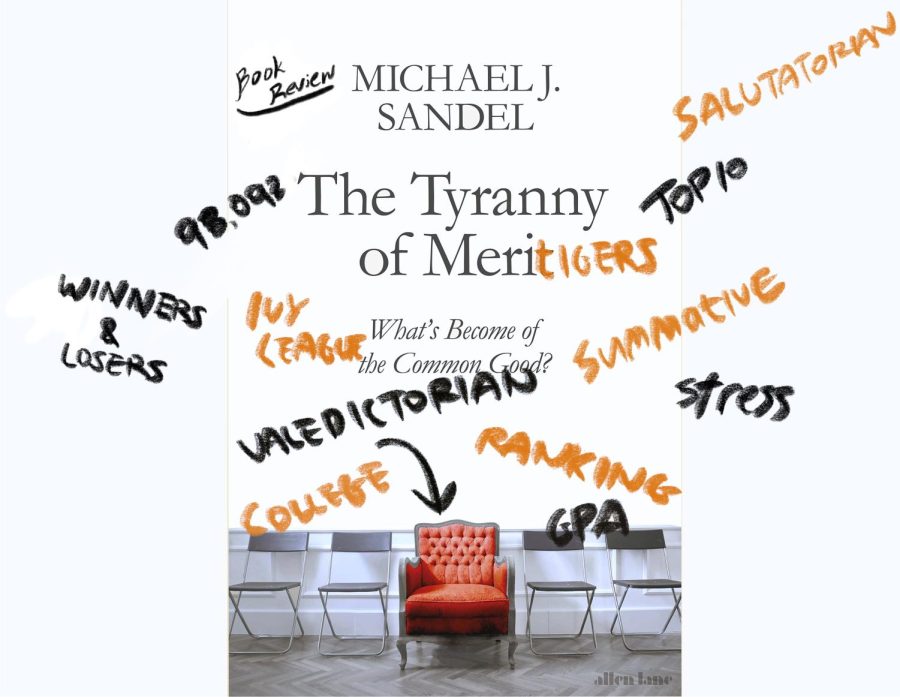The Tyranny of Merit Review: Can you make it if you try?
Jan 27, 2022
There he stood gallantly atop the podium as the proud salutatorian, offering final words of wisdom for the class of 2021. His choice, to declare that “luck doesn’t exist” and that opportunities are out there for everyone; it is just a matter of who capitalizes on the chances that come our way. Hearing these words offered a sense of empowerment, for it meant that we are the masters of our own fate. With hard work, perhaps one day we could be the ones standing on that very podium.
But world-renowned philosopher Michael Sandel challenges this meritocratic belief in his latest book published in September 2020, The Tyranny of Merit. According to Sandel, the powerful meritocracy is the poison that has polarized our society into a world made of winners and losers.
Sandel begins the book by explaining the majestic initial appeal of a meritocracy, “a system of rule, a way of allocating income and wealth and power and honor according to what people are said to deserve.” Its allure lies in the powerful “rhetoric of rising” that results: the belief that “you can make it if you try” holds a galvanizing sense of agency within our lives. Not only that, but it also comes as just that in a world where inequality is inevitable, the most deserving would get the largest share of the pie. This is the unique universal appeal that has allowed the meritocratic philosophy to receive support from Republicans and Democrats, liberals and conservatives alike.
However, Sandel declares that despite society doubling down on its belief in meritocracy, exacerbating inequality has stiffened social mobility more so than decades before. In turn, the “rhetoric of rising” now rings hollow, especially for those of lower socioeconomic statuses. The American Dream has become a myth and “lost the ability to inspire.”
According to Sandel, this problem stems from how a meritocracy brings hubris among the winners as they believe their success is their own doing. With the establishment of education as a passport to success, the wealthy now believe that the story of their success is a solo act more than ever before.
Therefore, the rich have been less compelled to share their success with the poor because, in a meritocracy, one’s failure is also one’s own doing. This is the toxic flip side of self-confidence among the winners, humiliation among the losers. In effect, rather than giving back, the credentialed elites have sought ways to embrace their status by monopolizing Ivy League college acceptances—sometimes through the back door SAT frauds, but mostly via the legal, front door with legacy admissions.
The intuitive solution to the shortcomings of our meritocracy appears quite simple: perfect our imperfect meritocracy by ensuring equality of opportunities. But Sandel shows that the problem with meritocracy runs deeper. Even in a complete meritocracy, he questions whether “success,” which is essentially a match between our innate talents and the attributes that society values, is truly up to our hard work. And more importantly, the issue of divisive hubris among the haves and humiliation among the have-nots persist.
This is where the true fruits of Tyranny of Merit lie. Sandel distinguishes his commentary from conventional criticisms of a meritocracy by focusing on its innate moral flaws, not on our imperfect attempt at crafting it. At first, these sharp criticisms of our deeply entrenched meritocratic system put us on the defensive.
Yet, with his characteristic eloquence, Sandel cogently provides a fresh point of view on meritocracy. The saying, “luck doesn’t exist,” suddenly comes as more divisive than inspirational.
As to how we can reform our meritocracy, Sandel suggests experimental ideas like instituting a college lottery system for Ivy League schools; doing so would outright recognize that success is contingent on luck. However, captured with the need to provide a tangible alternative, Sandel seems to overlook the moral questions ridden within the lottery system itself.
Maybe the real solution is to first challenge our meritocratic system. That can start by sharing the powerful, eye-opening revelations that Sandel brings with this book.







